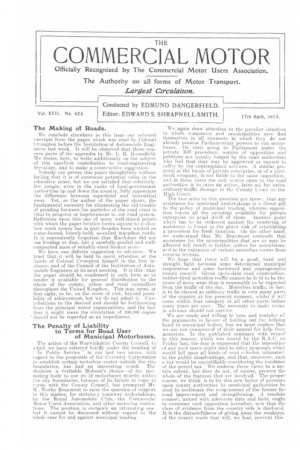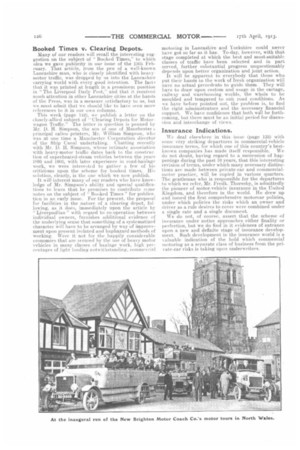The Making of Roads.
Page 1

Page 2

If you've noticed an error in this article please click here to report it so we can fix it.
We conclude elsewhere in this issue our seheited excerpts from the paper which was read by Colonel Crompton before the Institution of Automobile Engineers last week. It will be observed that these concern parts of the appendix by Mr. L. Ii. Hounsfield. We desire, here, to write additionally on the subject of this excellent contribution to road-engineering literature, and to make a constructive suggestion.
Nobody can peruse this paper thoughtfully without feeling that it is of enormous potential value in the educative sense, but we are satisfied that relativelyfew people, even in the ranks of local-government authorities up and down the country, folly appreciate the difference between superficial and interstitial wear. Yet, as the author of the paper shows, the fundamental necessity for eliminating the old trouble of grinding between the particles of the road crust is vital to progress or improvement in our road system. Reflection upon this one of many well-stated points with which the paper bristles forces anyone to realize how much money has in past decades been wasted on water-bound, loosely-held, so-called macadam roads. It is conveniently forgotten that MacAdam did not use binding or dust, but a carefully-graded and wellcompacted mass of suitably-sized broken stony.
We have one definite suggestion to advance. We trust that it will be held to merit attention at the hands of Colonel Crompton himself in the first instance, and of the Council of the Institution of Auto-mobile Engineers at its next meeting. It is this : that the paper should be condensed in such form as to render it available for general distribution to the whole of the county; urban and rural councillors throughout the United Kingdom. This may seem, at first sight, to be, on the score of cost, beyond possibility of achievement, but we do not admit it. Contributions to the desired end should be forthcoming from the principal motor organizations, and the fact that it might mean the circulation of 100,000 copies 'should not be regarded as an impediment.
The Penalty of Liability to Terms for Road User of Municipal Motorbuses.
The action of the Warwickshire Comity Council, to .which we have referred briefly under the heading of " In Public Service " in our last two issues, with regard to the proposals of the Coventry Corporation to establish certain motorbus routes outside the city boundaries, has had an interesting result. The decision—a veritable Hobson's choice—of the promoting body to use its 12 motorbuses strictly within Ore city boundaries, because of its failure to come to terms with the County Council, has prompted Mr. W. Worby Beaumont to raise the question of support in this matter, for statutor y tramway undertakings, by the Royal Automobile Club, the Commercial Motor Users Association, and other motoring iestitntions. The position is certainly an interestir:g one. but it cannot be discussed without regard to the whole ease for and against municipal trading.
We again draw attention to the peculiar situation in which companies and municipalities now find themselves in all instances in which they do not already possess .Parliamentary powers to run motorbuses. On their going to Parliament under the private Bill procedure, notices of opposition and petitions are usually lodged by the road authorities who feet that they may be aggrieved or caused to :diner by the contemplated services. A similar proposal at the hands of private enterprise, or of a jointstock company, is not liable to the same opposition. and in those eases the only course open to the road authorities is to raise an action, later on, for extraordinary-traffic damage in the County Court or the High Court.
The two sides to this question are these: that any assistance for municipal undertakings is a direct gift to the policy of municipal trading. whereas opposition leaves all the openings available for private enterprise to avail itself of them. Another point Nvhich has to be reckoned againstthe rendering of assistance is found in the grave risk of establishing aprecedent for fresh taxatioo. On the other hand. we understand that Mr. Beaumont contends that assistance for the municipalities that are or may be affected will result in further orders for motorbuses. aid in the -extension of various motorbus routes from tramcar termini.
We hope that there will be a good, hard and straight fight between some determined municipal corporation and some backward and unprogressive county council. Given up-to-date road construction. rubber-tired motorbus traffic cannot he held to be the cause of more wear than is reasonably to be expected from the traffic of the day. Motorbus traffic, in fact, is to be classed as ordinal y traffic in very many parts of the country at the present moment, whilst it will come within that category in all other parts before many years are over. The necessity to make terms in advance shmdd not survive.
We are ready and wdling to hear and consider all the arguments in favour of holding out the helping hand to municipal bodies, but we must confess that we .are not enamoured of their appeal for help from motorists. In the published summary with regard to this matter, which was issued by the R.A.C. Friday last, the fear is expressed that the imposition of any such taxes might lead to other proposals which would fall upon all kinds of road vehicles, ultimately to the public disadvantage, and that, moreover, such a lax would be unjustifiable considering the incidence of the petrol tax. We endorse these views to a chen. tam n extent, but they do not, of course, present the whole of the features that are involved. The proper course, we think, is to let this new factor of pressure upon county authorities by municipal authorities be used to accelerate the programmes of the former for road improvement and strengthening. A resolute counsel, armed with adeouate data and facts, ought to overcome such opposition hereafter, now that the class of evidence from the country side is disclosed. It is the distastefulness of giving away the weakness of the county roads that will, we fear, prevent this.
Booked Times v. Clearing Depots.
Many of our readers will recall the interesting suggestion on the subject of " Booked Times," to which idea we gave publicity in our issue of the 131-h February. That article, from the pen of a well-known Lancashire man, who is closely identified with heavymotor traffic, was dropped by its into the Larica.shne carrying world with every good intention, The facts that it was printed at length in a prominent position in "The, Liverpool Daily Post," and that it received much attention in other Lancashire cities at the hands of the Press, was in a measure satisfactory to us, but we must admit that we should like to have seen more references to it in our own columns.
This week (page 142), we publish a letter on the closely-allied subject of "Clearing Depots for Motorwagon Traffic." The letter in question is penned by Mr, D. H. Simpson, the son of one of Manchester s principal calico printers, Mr. William Simpson, who was at one time a Manchester Corporation director of the Ship Canal undertaking. Chatting recently with Mr. D. H. Simpson, whose intimate association with heavy-motor traffic, dates back to the construe tion of superheated-steam vehicles between the years 1S95 and 1903, with later experience in road-haulage work, we were interested to gather a few of his criticisms upon the scheme for booked times. His solution, clearly, is the one which we now publish.
It will interest many of our readers who have knowledge of Mr. Simpson's ability and special qualifications to learn that he promises to contribute same notes on the subject of "Booked Times" for publication in an early issue. For the present, the proposal for facilities in the nature of a clearing depot, following, as it does, immediately upon the article by " Liverpudlian" with regard to co-operation between individual owners, furnishes additional evidence of the underlying sense that something of a aystematized character will have to be arranged by way of improvement upon present isolated and haphazard methods of working. Were it not for the happily considerable economies that are secured by the use of heavy motor vehicles in many classes of haulage work, high percentages of light loading notwithstanding. commercial motoring in Lancashire and Yorkshire could never have got so far as it has, To-day, however, with that stage completed at which the best and most-suitable classes of traffic have been selected and in part served, further substantial progress unquestionably depends upon better organization and joint action. It will be apparent to everybody that those who put their hands to the work of fresh organization will have no actual precedents to guide them. They will have to draw upon custom and usage in the cartage, railway and warehousing worlds, the whole to be moulded and tempered to suit road conditions. As we have before pointed out, the problem is, to find the right administrators and the necessary financial support. We have confidence that both will be forthcoming, but there must be an initial period for discussion and interchange of views.
Insurance Indications.
We deal elsewhere in this issue (page 133) with some very striking departures in commercial-vehicle insurance terms, for which one of this country's bestknown companies has made itself responsible. We do not doubt, having regard to a succession of happenings during the past 10 years, that this interesting revision of terms, under which many necessary distinctions are made between private-car and commercialmotor practice, will be copied in various quarters. Thegentleman who is responsible for the departures to which we refer, Mr. Fredk. Thoresby, is admittedly the pioneer of motor-vehicle insurance in the United Kingdom, and therefore in the world. He drew up and issued the first comprehensive motorcar policies, under which policies the risks which an owner and driver as a rule desires to cover were combined under a single rate and a single document.
We do not, of course, assert that the scheme of insurance under notice approaches either finality or perfection, but we do find in it evidences of entrance upon a new and definite stage of insurance development. Such development in the insurance world is a valuable indication of the hold which commercial motoring as a separate class of business from the private-car risks is taking upon underwriters.






















